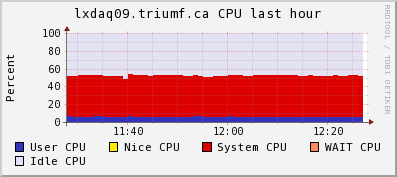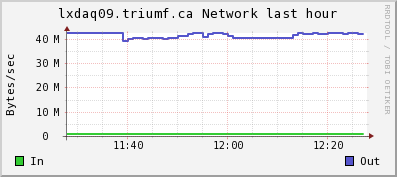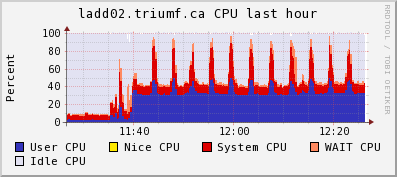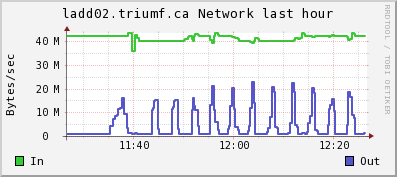| ID |
Date |
Author |
Topic |
Subject |
|
1747
|
04 Dec 2019 |
Konstantin Olchanski | Release | midas-2019-09-e |
> I created the release branch for midas-2019-09 and tag midas-2019-09-a.
> Since the previous release midas-2019-06, some news:
>
> - new history graphics (Stefan)
> - c++ frontend framework mvodb.h and tmfe.h merged from ALPHA-g (K.O.)
> - we think we have all the fallout from switching to cmake and to c++11 sorted out
>
midas-2019-09-e is here.
- the new history plots now work both for Stefan *and* for me, please try them out!
- no new problems with cmake and c++11.
- fixes for some reported bugs
- some bugs remain to be fixed, so with luck, there will by a midas-2019-09-f.
> add all the pending missing code (the new sequencer web pages, the "m" analyzer, etc
pending for midas-2019-12:
- new sequencer web pages
- the "m" analyzer merge (from rootana)
- python-client branch merge (thanks to Ben!)
- simplified odb settings for mlogger and mhttpd configuration
- mhttpd update to mongoose 6.16
To obtain this release, either checkout the top of branch feature/midas-2019-09 (recommended)
or checkout the tag midas-2019-09-e.
K.O. |
|
1706
|
27 Sep 2019 |
Konstantin Olchanski | Release | midas-2019-09 |
I created the release branch for midas-2019-09 and tag midas-2019-09-a.
Since the previous release midas-2019-06, some news:
- new history graphics (Stefan)
- c++ frontend framework mvodb.h and tmfe.h merged from ALPHA-g (K.O.)
- we think we have all the fallout from switching to cmake and to c++11 sorted out
There is a number of known problems with the current code, see the bitbucket bug tracker:
https://bitbucket.org/tmidas/midas/issues?status=new&status=open
Hopefully we can use this release as a baseline for more testing and with luck we will
fix all the pending bugs and add all the pending missing code (the new sequencer web pages,
the "m" analyzer, etc) quickly and our next release midas-2019-10 will be the best midas ever.
To obtain this release, either checkout the top of branch feature/midas-2019-09 (recommended)
or checkout the tag midas-2019-09-a.
If you are using the last pre-cmake/c++ release midas-2019-03, I recommend that you stay with it
until our next release midas-2019-10.
K.O. |
|
1564
|
19 Jun 2019 |
Konstantin Olchanski | Release | midas-2019-06 with cmake and c++ |
We are happy to the midas release "midas-2019-06" with the build system implemented in cmake and the midas, mxml and mscb
projects switched to C++.
Changes since midas-2019-03:
minor bug fixes
switch of midas build to c++ with c++ linkage (no "extern C")
switch of midas build to cmake
removal of $(OS_DIR) from the midas library and bin paths (use $MIDASSYS/lib instead of $MIDASSYS/linux/lib)
mxml and mscb are implemented as git submodules
Please review the following guide to update midas from previous release midas-2019-03 or older.
Update the code:
git checkout develop
git pull
git checkout feature/midas-2019-06
git pull
git submodule update --init # this will checkout correct versions of mxml and mscb
make clean
make cclean
rm -rf linux/bin
rm -rf linux/lib
rmdir linux
make cmake3 # or "make cmake" on ubuntu and macos
ls -l bin/odbedit bin/mlogger
Update experiment environment:
- change PATH from $MIDASSYS/linux/bin to $MIDASSYS/bin
Cleanup unneeded stuff:
- remove $HOME/packages/mxml (new location $MIDASSYS/mxml)
- remove $HOME/packages/mscb (new location $MIDASSYS/mscb)
Update experiment frontend build:
- change Makefile to remove $(OS_DIR) from library search path ($MIDASSYS/linux/lib becomes $MIDASSYS/lib)
- change Makefile to set mxml include path from $MIDASSYS/../mxml to $MIDASSYS/mxml (to avoid including the wrong
version of mxml/strlcpy.h)
- update frontend code to use mfe.h and build as C++, see https://midas.triumf.ca/elog/Midas/1526
K.O. |
|
1578
|
27 Jun 2019 |
Stefan Ritt | Release | midas-2019-06 with cmake and c++ |
Please note that
"make cmake" / "make cmake3"
is an abbreviation for the "normal" cmake command chain. Users familiar with cmake can also do the standard command chain:
mkdir build
cd build
cmake ..
make
make install
- Stefan
> We are happy to the midas release "midas-2019-06" with the build system implemented in cmake and the midas, mxml and mscb
> projects switched to C++.
>
> Changes since midas-2019-03:
>
> minor bug fixes
> switch of midas build to c++ with c++ linkage (no "extern C")
> switch of midas build to cmake
> removal of $(OS_DIR) from the midas library and bin paths (use $MIDASSYS/lib instead of $MIDASSYS/linux/lib)
> mxml and mscb are implemented as git submodules
>
> Please review the following guide to update midas from previous release midas-2019-03 or older.
>
> Update the code:
>
> git checkout develop
> git pull
> git checkout feature/midas-2019-06
> git pull
> git submodule update --init # this will checkout correct versions of mxml and mscb
> make clean
> make cclean
> rm -rf linux/bin
> rm -rf linux/lib
> rmdir linux
> make cmake3 # or "make cmake" on ubuntu and macos
> ls -l bin/odbedit bin/mlogger
>
> Update experiment environment:
>
> - change PATH from $MIDASSYS/linux/bin to $MIDASSYS/bin
>
> Cleanup unneeded stuff:
>
> - remove $HOME/packages/mxml (new location $MIDASSYS/mxml)
> - remove $HOME/packages/mscb (new location $MIDASSYS/mscb)
>
> Update experiment frontend build:
>
> - change Makefile to remove $(OS_DIR) from library search path ($MIDASSYS/linux/lib becomes $MIDASSYS/lib)
> - change Makefile to set mxml include path from $MIDASSYS/../mxml to $MIDASSYS/mxml (to avoid including the wrong
> version of mxml/strlcpy.h)
> - update frontend code to use mfe.h and build as C++, see https://midas.triumf.ca/elog/Midas/1526
>
> K.O. |
|
1543
|
06 Jun 2019 |
Konstantin Olchanski | Release | midas-2019-03-h |
> > the midas release 2019-03 is ready for general use.
A bug fix update for midas-2019-03:
- fix broken expand_env() in mhttpd
- fix "Invalid name passed to db_create_key: should not be an empty string" in midas.log when loading the MIDAS status page if one of the alarms has empty
class name.
odbedit "ver" should report: Thu Jun 6 18:02:14 2019 -0700 - midas-2019-03-h on branch feature/midas-2019-03
K.O. |
|
1530
|
22 May 2019 |
Konstantin Olchanski | Release | midas-2019-03-g |
> the midas release 2019-03 is ready for general use.
first ever bug fix release on a git release branch.
fixed a crash if frontend built against this midas is connected to mserver from old (pre-db_watch) midas (size mismatch of MSG_ODB
message).
to use this update:
# recommended:
git pull
git checkout feature/midas-2019-03
git pull
make ...
# or checkout "detached HEAD"
git pull
git checkout midas-2019-03-g
make ...
odbedit "ver" should report:
GIT revision: Wed May 22 07:35:11 2019 -0700 - midas-2019-03-g on branch feature/midas-2019-03
K.O.
P.S. Thanks for finding this bug go to Greg Hackman on TIGRESS and EMMA experiments at TRIUMF.
K.O. |
|
1513
|
28 Mar 2019 |
Konstantin Olchanski | Release | midas-2019-03-f |
the midas release 2019-03 is ready for general use.
main changes from previous releases (midas-2017-10, midas-2018-12 and midas-2019-02):
- change to the midas URL scheme
- removal of cm_watchdog()
- rewrite of event buffer code (and fix of hard to trigger event buffer corruption bug)
- fully thread safe odb and event buffer code (except for rpc_send_event())
- corrected compatibility problems wrt older versions of midas when serving custom web pages via odb /custom/path
To obtain this release, either checkout the top of branch feature/midas-2019-03 (recommended)
or checkout the tag midas-2019-03-f.
K.O. |
|
1113
|
16 Sep 2015 |
Konstantin Olchanski | Info | midas wiki upgraded |
The midas wiki at https://midas.triumf.ca has been upgraded to mediawiki version 1.25.2 (current
production version). If you see any problems, please report them on this forum. K.O. |
|
1544
|
07 Jun 2019 |
Konstantin Olchanski | Forum | midas wiki updated to mediawiki 1.27.7 |
the midas wiki was updated to the latest LTS point release 1.27.7, the latest (last?) security update.
mediawiki series 1.27 is now officially EOL, see
https://lists.wikimedia.org/pipermail/mediawiki-announce/2019-June/000231.html
they recommend that all users upgrade to the current LTS series 1.31.
for us it means moving the wiki from the present el6 (SL6) computer to
a more up-to-date platform (el8 or ubuntu LTS 18.04).
K.O. |
|
1538
|
03 Jun 2019 |
Konstantin Olchanski | Forum | midas wiki updated to mediawiki 1.27.5 |
the midas wiki was updated to the latest LTS point release 1.27.5.
Also, an installation error was fixed that prevented confirmation of new accounts (git checkout
REL1_28 instead of REL1_27, resulting in a version mismatch).
Support for MediaWiki LTS release 1.27 ends this Summer.
Next LTS release series is 1.31, see https://en.wikipedia.org/wiki/MediaWiki_version_history
This version requires php version 7 or newer which comes standard with ubuntu LTS 18.04
and el8 (RHEL8), but not with el6 (SL6) and el7 (CentOS-7).
I guess we shall start planning this upgrade and the move of the wiki to a new host machine.
K.O. |
|
1222
|
01 Dec 2016 |
Konstantin Olchanski | Info | midas wiki updated to mediawiki 1.27.1 |
midas wiki at https://midas.triumf.ca/MidasWiki/index.php/Main_Page
was updated to MediaWiki version 1.27.1, the current MediaWiki LTS release.
Everything should work as before, but if you see any problems or anomalies, please report
them on this forum here.
K.O. |
|
982
|
14 Mar 2014 |
Konstantin Olchanski | Info | midas wiki updated to mediawiki 1.22.4 |
The midas wiki at https://midas.triumf.ca was updated to mediawiki 1.22.4 - the latest production version.
If you see any problems, please report them to this elog. K.O. |
|
1142
|
20 Nov 2015 |
Konstantin Olchanski | Info | midas wiki doxygen documentation links |
I updated the links on the midas wiki to the doxygen-generated documentation for MIDAS that you
get after running "git clone midas; cd midas; make dox; firefox html/index.html".
Correct link is:
https://daq.triumf.ca/~daqweb/doc/midas-devel/html/
This takes you to a daily/nightly generated snapshot of the midas develop branch and the
generated documentation with full call graphs.
Previous links were deficient is different ways:
- referred to http://ladd00 instead of https://daq
- referred to wrong path ~daqweb/doc/midas instead of ~daqweb/doc/midas-devel
- referred to the obsolete doxygen generator in midas/doc/html instead of midas/html.
If wrong links are still present on the midas wiki, please let us know and we will fix them.
K.O. |
|
2583
|
16 Aug 2023 |
Konstantin Olchanski | Bug Report | midas wants to show notification? |
I started to get web browser popups about "midas wants to show notifications,
block/allow/x". is this a glitch or a new unannounced/undocumented feature?
google chrome on macos. K.O. |
|
2584
|
16 Aug 2023 |
Stefan Ritt | Bug Report | midas wants to show notification? |
> I started to get web browser popups about "midas wants to show notifications,
> block/allow/x". is this a glitch or a new unannounced/undocumented feature?
> google chrome on macos. K.O.
https://bitbucket.org/tmidas/midas/commits/e101dea764c647211c560a68db7ecda1834198db
I did not consider this a significant feature to be announced here. Just a few lines
of code. You can turn it on/off via the "Config" web page.
Stefan |
|
2585
|
16 Aug 2023 |
Stefan Ritt | Bug Report | midas wants to show notification? |
> > I started to get web browser popups about "midas wants to show notifications,
> > block/allow/x". is this a glitch or a new unannounced/undocumented feature?
> > google chrome on macos. K.O.
>
> https://bitbucket.org/tmidas/midas/commits/e101dea764c647211c560a68db7ecda1834198db
>
> I did not consider this a significant feature to be announced here. Just a few lines
> of code. You can turn it on/off via the "Config" web page.
>
> Stefan
Now as I look at it again I realized that the config check boxes had a bug. I fixed that
and now the disable should work correctly.
This feature was asked by some people who monitor an experiment and have the browser window
in the background, also have sound off (large office). So desktop notifications are a good
thing for them.
Stefan |
|
2586
|
16 Aug 2023 |
Konstantin Olchanski | Bug Report | midas wants to show notification? |
> This feature was asked by some people ...
"show notifications" popups are strongly associated with disreputable web sites (presumably to
push spam), it was surprising to see it from midas.
K.O. |
|
2589
|
17 Aug 2023 |
Stefan Ritt | Bug Report | midas wants to show notification? |
> > This feature was asked by some people ...
>
> "show notifications" popups are strongly associated with disreputable web sites (presumably to
> push spam), it was surprising to see it from midas.
>
> K.O.
I agree. But unlike emails (where you get lots of spam as well), you can nicely blacklist/whitelist
desktop notifications. I suppress all of them except the one for MIDAS. This allows me to watch our
experiment without staring on the web page all the time.
The main question here is maybe if the desktop notification should be on or off by default (for a
fresh browser). While you always can change that via the mhttpd "Config" page, the default value is
chosen by the system. I thought I put it to "on" so people can experience it, and then turn it off if
they don't like. Having them off by default, most people never would notice this possibility. But I'm
open to a discussion here.
Stefan |
|
805
|
20 Jun 2012 |
Konstantin Olchanski | Info | midas vme benchmarks |
I am recording here the results from a test VME system using two VF48 waveform digitizers and a 64-bit
dual-core VME processor (V7865). VF48 data suppression is off, VF48 modules set to read 48 channels,
1000 ADC samples each. mlogger data compression is enabled (gzip -1).
Event rate is about 200/sec
VME Data rate is about 40 Mbytes/sec
System is 100% busy (estimate)
System utilization of host computer (dual-core 2.2GHz, dual-channel DDR333 RAM):
(note high CPU use by mlogger for gzip compression of midas files)
top - 12:23:45 up 68 days, 20:28, 3 users, load average: 1.39, 1.22, 1.04
Tasks: 193 total, 3 running, 190 sleeping, 0 stopped, 0 zombie
Cpu(s): 32.1%us, 6.2%sy, 0.0%ni, 54.4%id, 2.7%wa, 0.1%hi, 4.5%si, 0.0%st
Mem: 3925556k total, 3797440k used, 128116k free, 1780k buffers
Swap: 32766900k total, 8k used, 32766892k free, 2970224k cached
PID USER PR NI VIRT RES SHR S %CPU %MEM TIME+ COMMAND
5169 trinat 20 0 246m 108m 97m R 64.3 2.8 29:36.86 mlogger
5771 trinat 20 0 119m 98m 97m R 14.9 2.6 139:34.03 mserver
6083 root 20 0 0 0 0 S 2.0 0.0 0:35.85 flush-9:3
1097 root 20 0 0 0 0 S 0.9 0.0 86:06.38 md3_raid1
System utilization of VME processor (dual-core 2.16 GHz, single-channel DDR2 RAM):
(note the more than 100% CPU use of multithreaded fevme)
top - 12:24:49 up 70 days, 19:14, 2 users, load average: 1.19, 1.05, 1.01
Tasks: 103 total, 1 running, 101 sleeping, 1 stopped, 0 zombie
Cpu(s): 6.3%us, 45.1%sy, 0.0%ni, 47.7%id, 0.0%wa, 0.2%hi, 0.6%si, 0.0%st
Mem: 1019436k total, 866672k used, 152764k free, 3576k buffers
Swap: 0k total, 0k used, 0k free, 20976k cached
PID USER PR NI VIRT RES SHR S %CPU %MEM TIME+ COMMAND
19740 trinat 20 0 177m 108m 984 S 104.5 10.9 1229:00 fevme_gef.exe
1172 ganglia 20 0 416m 99m 1652 S 0.7 10.0 1101:59 gmond
32353 olchansk 20 0 19240 1416 1096 R 0.2 0.1 0:00.05 top
146 root 15 -5 0 0 0 S 0.1 0.0 42:52.98 kslowd001
Attached are the CPU and network ganglia plots from lxdaq09 (VME) and ladd02 (host).
The regular bursts of "network out" on ladd02 is lazylogger writing mid.gz files to HADOOP HDFS.
K.O. |
| Attachment 1: lxdaq09cpu.gif
|

|
| Attachment 2: lxdaq09net.gif
|

|
| Attachment 3: ladd02cpu.gif
|

|
| Attachment 4: ladd02net.gif
|

|
|
806
|
20 Jun 2012 |
Konstantin Olchanski | Info | midas vme benchmarks |
> I am recording here the results from a test VME system using two VF48 waveform digitizers
Note 1: data compression is about 89% (hence "data to disk" rate is much smaller than the "data from VME" rate)
Note 2: switch from VME MBLT64 block transfer to 2eVME block transfer:
- raises the VME data rate from 40 to 48 M/s
- event rate from 220/sec to 260/sec
- mlogger CPU use from 64% to about 80%
This is consistent with the measured VME block transfer rates for the VF48 module: MBLT64 is about 40 M/s, 2eVME is about 50 M/s (could be
80 M/s if no clock cycles were lost to sync VME signals with the VF48 clocks), 2eSST is implemented but impossible - VF48 cannot drive the
VME BERR and RETRY signals. Evil standards, grumble, grumble, grumble).
K.O. |